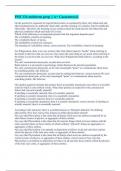PHI 334 midterm prep || A+ Guaranteed.
On the positivist's argument for logical behaviorism, as explained by Kim, only behavioral and
physical phenomena are publically observable, and the meaning of a sentence must be publically
observable. Therefore, the meaning of any sentence about the mind must be the behavioral and
physical conditions which must hold if it is true.
Which of the following is an important premise that this argument depends upon?
The verifiability criterion of meaning.
The veritability theory of norms.
The ineffability criterion for sentences.
The meaning of verifiability criteria. correct answers The verifiability criterion of meaning.
For Wittgenstein, there is no way to know that what others mean by "beetle" when referring to
the beetle in their box that you can't see, they mean the same thing as you mean when referring to
the beetle in your box that you can't see. What does Wittgenstein think follows, according to the
lecture?
We can't communicate about pain, so pain does not exist.
Behaviorism is a movement in psychology which dismisses the inward experiential.
We can't communicate about pain, so the only meaningful "pains" we communicate about must
be something public, like behavior.
We can communicate about pain, so pain must be nothing but behavior. correct answers We can't
communicate about pain, so the only meaningful "pains" we communicate about must be
something public, like behavior
One dualist argument includes the premise that I am possibly immaterial, since there is a possible
world in which I exist without a body. What other premise is needed for it the conclusion to
follow that I am not actually material?
If anything is essentially material, then it is actually material.
If anything is actually immaterial, then it is essentially immaterial.
If anything is actually material, then it is essentially material.
If anything is essentially immaterial, then it is acutally immaterial. correct answers if anything is
actually material, then it is essentially material.
According to the instructor, there is a problem known as "Hempel's dilemma" for defining
physicalism. How does Alyssa Ney propose to define physicalism instead?
Ney says that Physicalism is the claim that all things which exist are entities recognized by an
ideal future science of physics, or aggregates of these entities.
Ney says that Physicalism is the claim that all concrete things which exist are entities with the
same essential nature as those entities of which ordinary "physical" things are aggregates, or
aggregates of these entities.
Ney says that Physicalism is an attitude or disposition to believe in all and only those entities
which the physics of the time says exists, or aggregates of these entities.
Ney says that Physicalism is the claim that all things which exist are entities recognized by the
current science of physics, or aggregates of these entities. correct answers Ney says that
Physicalism is an attitude or disposition to believe in all and only those entities which the physics
of the time says exists, or aggregates of these entities.
, Descartes's arguments for the conclusion that I am not my body often depend on the premise that
in some possible worlds I could be disembodied, or at least that I could have a different body in
another possible world. How do most physicalists justify rejecting this premise, according to the
lecture?
Something can be possible without being relevant to what a thing is.
Something can be conceivable without being possible.
Something can be possible without being relevant to what a thing is.
It's impossible that I exist in other possible worlds. correct answers Something can be
conceivable without being possible.
According to the lecture, one philosopher argued for substance dualism using this argument:
P1 the most basic physical substances do not have mentality
P2 no interaction of non-mental parts can give rise to a whole with mentality
P3 we have mentality
C we are not composed of physical substance
Whose argument is this?
Leibniz
Locke
Descartes
Plato correct answers Leibniz
What is the "pairing problem" for Substance Dualism?
Brains cannot stand in non-physical relations, and souls cannot stand in physical relations, so
brains and souls cannot stand in relations to each other.
A pair of souls can occupy the same spacial-temporal region, but a pair of brains cannot occupy
the same spacial-temporal region, so brains cannot contai souls.
Brains are intrinsically physical, and souls are intrinsically non-physical, so brains and souls
cannot stand in intrinsic relations to each other.
Brains are made up of a pair of hemispheres, but souls are simple and indivisible, so brains
cannot contain souls. correct answers Brains cannot stand in non-physical relations, and souls
cannot stand in physical relations, so brains and souls cannot stand in relations to each other.
Which of the following is NOT an example Kim gives of a major problem in the Philosophy of
Mind?
what conditions must a creature meet before it is worthy of moral respect?
what conditions must a system meet before we attribute mentality to it?
what is the relationship between the mind and the body?
what are the relationships between beliefs, emotions, sensations, and speech? correct answers
what conditions must a creature meet before it is worthy of moral respect?
ccording to Cartesian dualism, what is the relationship between mind and body?
the mind IS identical with the body, but it DOES have distinct causal powers
the mind is NOT identical with the body, and it DOES NOT causally interact with the body
the mind is NOT identical with the body, but it DOES causally interact with the body




